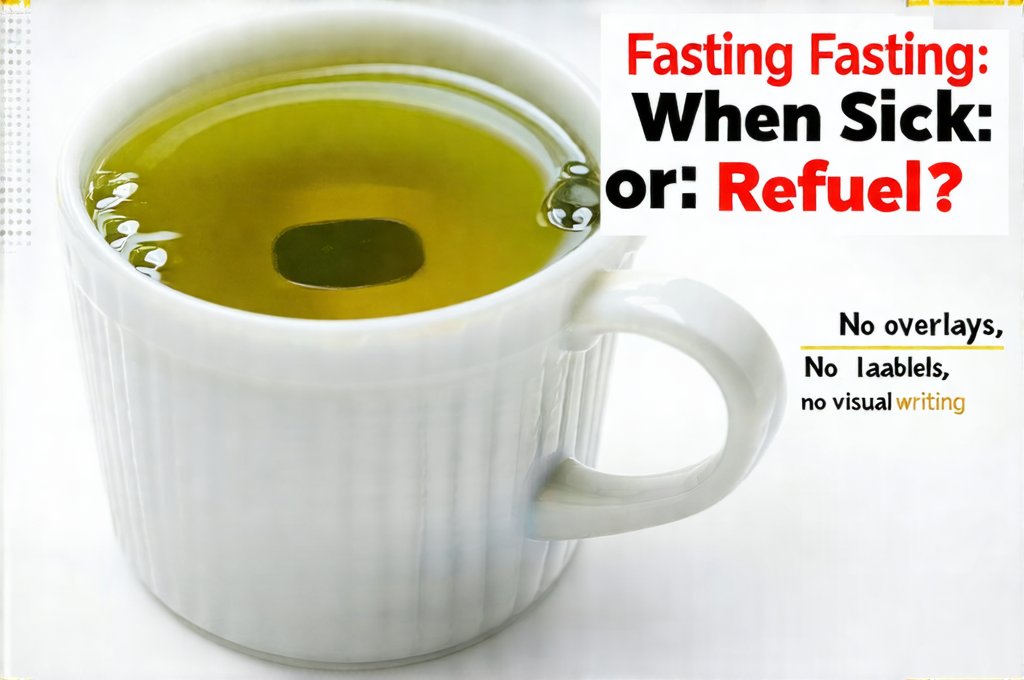The question of whether to fast when sick is surprisingly complex, often stirring debate among wellness communities and sparking confusion for individuals trying to navigate illness. Our intuitive response often leans toward ‘nourishing’ ourselves back to health – consuming nutrient-rich foods and fluids to “fight” the sickness. However, the body’s needs shift dramatically during illness, and the traditional advice of constantly refueling may not always be optimal. The digestive system, for example, is heavily taxed when fighting off infection, diverting resources away from immune function. This means that continuing to force food upon a reluctant or overwhelmed system can sometimes hinder recovery rather than help it.
Understanding this nuance requires moving beyond blanket statements about fasting and illness. It’s not simply about whether or not to avoid eating; it’s about understanding the physiological changes happening within the body when sick, recognizing different types of illnesses, and tailoring our approach accordingly. Fasting, in its various forms (from intermittent time-restricted eating to prolonged water fasts), isn’t inherently good or bad – it’s a tool that can be used appropriately or inappropriately depending on the context. This article will explore the considerations around fasting during illness, focusing on when rest might be more beneficial than refueling and highlighting the importance of listening to your body’s signals.
The Body’s Response to Illness & Fasting
When we become ill, our bodies enter a state of heightened metabolic activity focused almost entirely on immune defense. This requires a significant reallocation of energy resources. Instead of prioritizing digestion and nutrient absorption, the body shifts its focus to producing immune cells, fighting off pathogens, and repairing damaged tissues. Digestion itself is an energy-intensive process – breaking down food, absorbing nutrients, and eliminating waste all demand substantial energy expenditure. During illness, this energy drain can actually weaken the immune response, leaving you feeling more fatigued and prolonging recovery time.
Furthermore, many illnesses cause a natural reduction in appetite. This isn’t merely a sign of weakness; it’s an instinctive biological mechanism designed to conserve energy. The body knows it needs resources for healing and naturally downregulates the desire to eat. Trying to force food when your appetite is suppressed can lead to discomfort, nausea, and even vomiting, further stressing the system. Intermittent fasting, or simply reducing food intake significantly, aligns with this natural physiological response, allowing the body to dedicate more energy to immune function without being burdened by digestion.
However, it’s crucial to differentiate between a mild illness like a common cold and more serious conditions that require sustained nutritional support. For example, individuals recovering from surgery or dealing with chronic illnesses often need adequate caloric intake to facilitate healing. The key is recognizing the specific nature of your illness and adjusting your dietary approach accordingly – sometimes resting the digestive system through reduced eating is beneficial, while other times consistent nourishment is essential. If you struggle with knowing what to eat when feeling unwell, consider exploring keto meals that are easy on the system.
Understanding Different Illnesses & Fasting Approaches
The appropriate response to illness varies dramatically depending on the type of ailment. A mild upper respiratory infection (like a cold or flu) often benefits from temporary fasting or significantly reduced food intake. The body’s immune system can effectively combat these viruses with minimal nutritional support, and resting digestion allows for quicker recovery. In these cases, focusing on hydration – drinking plenty of water, herbal teas, and electrolyte-rich fluids – is far more important than consuming a large meal.
Conversely, illnesses that significantly deplete nutrient stores or require substantial energy for repair (such as severe infections, chronic diseases, or post-surgical recovery) generally necessitate adequate nutrition. Fasting in these situations could be detrimental, potentially weakening the immune system and hindering healing processes. For instance, someone recovering from a major surgery needs protein to rebuild tissues and carbohydrates for energy. A prolonged fast would compromise their ability to heal effectively.
It’s also important to consider the individual’s pre-existing health conditions. Individuals with diabetes or other metabolic disorders should exercise extreme caution when considering fasting during illness, as it could exacerbate these conditions. Always consult with a healthcare professional before making significant changes to your diet, especially when you are unwell. This is not about self-treating; it’s about informed decision-making based on your unique circumstances. If you find yourself feeling stuck and unsure of how to approach this, take a look at my daily menu for some inspiration.
Hydration & Electrolyte Balance During Illness
Regardless of whether you choose to fast or continue eating during illness, hydration remains paramount. Fever, vomiting, and diarrhea all contribute to fluid loss, which can quickly lead to dehydration. Dehydration weakens the immune system, impairs cognitive function, and prolongs recovery time. Water is essential, but it’s not the whole story. Electrolytes – sodium, potassium, magnesium, and chloride – are also lost through these processes and need to be replenished.
- Sip on water throughout the day, even if you don’t feel thirsty.
- Consider electrolyte-rich beverages like coconut water or herbal teas with a pinch of sea salt.
- Avoid sugary drinks, as they can suppress immune function and contribute to inflammation.
- If experiencing significant vomiting or diarrhea, oral rehydration solutions (ORS) are highly recommended.
Maintaining adequate electrolyte balance is crucial for proper cellular function and overall health. Symptoms of dehydration include headache, fatigue, dizziness, muscle cramps, and dark urine. Recognizing these signs early on allows you to address the issue promptly and prevent further complications. The focus during illness should often shift from “what can I eat?” to “how can I stay hydrated?”. Understanding fasting for inflammation might also help you understand the benefits of reduced eating when sick.
Listening To Your Body’s Signals
Ultimately, the most important guide when deciding whether to fast or refuel during illness is your own body. Pay close attention to how you feel and adjust your dietary approach accordingly. If you have absolutely no appetite and feel nauseous at the thought of food, forcing yourself to eat will likely do more harm than good. Allow your body to rest and focus on healing.
Conversely, if you feel weak and depleted and crave nutritious foods, then listen to those signals and provide your body with the nourishment it needs. This isn’t about adhering to rigid rules or following a specific diet plan; it’s about responding to your body’s innate wisdom. Intuitive eating – tuning into your internal cues of hunger and fullness – becomes even more critical during illness.
Be mindful of any changes in your symptoms. If fasting exacerbates your condition or causes new symptoms to arise, immediately discontinue the fast and seek medical attention if necessary. Remember that this is not about proving your willpower or adhering to a particular ideology; it’s about supporting your body’s natural healing processes and prioritizing your well-being. The best approach is always one of mindful self-care and attentive listening. If you are unsure how to begin, explore how to start fasting as a gentle introduction.




